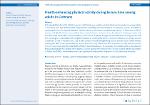Health-enhancing physical activity during leisure time among adults in Germany
Finger, Jonas D.
Mensink, Gert
Lange, Cornelia
Manz, Kristin
Self-reported data from the GEDA 2014/2015-EHIS study was used to calculate the level of compliance among adults in Germany with the World Health Organization’s (WHO) recommendations on physical activity. The WHO’s recommendations distinguish between ‘aerobic activity’ and ‘muscle-strengthening activity’. In Germany, 42.6% of women and 48.0% of men reported that they conduct at least 2.5 hours of aerobic physical activity per week, and therefore meet the WHO’s recommendation on this form of activity. A higher level of education among women and men of all ages is associated with a higher frequency of meeting the WHO’s recommendations on aerobic activity. In addition, 27.6% of women and 31.2% of men conduct muscle-strengthening activity at least twice a week, thereby meeting the WHO’s recommendations on this form of activity. About one fifth of women (20.5%) and one quarter of men in Germany (24.7%) meet both of these recommendations. In summary, the results point to the value of encouraging people to conduct more physical activity during their leisure time. In fact, inactive people who begin to follow the WHO’s recommendations can significantly reduce their long-term risk of premature mortality.
No license information

